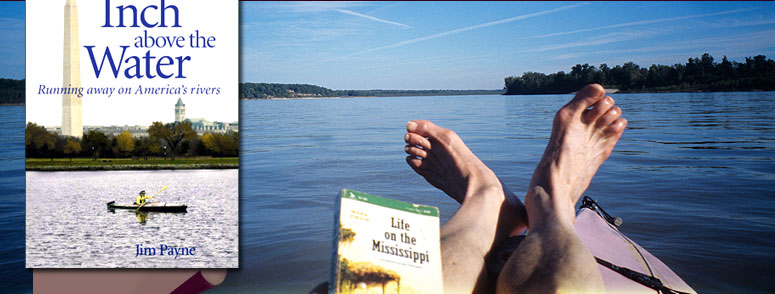Voyage on the Connecticut (page 11)
I suddenly remembered my kayak, which was tied with two mooring lines strung out to tree branches. If this beast wandered by it, it could tangle itself in the ropes. I had a vision of the bull dashing over hill and dale, dragging my splintered boat clattering behind. Hoping to scare it away, I flashed my light at it: a very dumb thing to do, since it only succeeded in attracting the bull’s attention. It turned to face me, 20 feet away, aggressively pawing at the dirt with its foot, like a bull in the Pamplona arena. I stared at him while he stared back. I considered leaping out, screaming and waving my arms to scare him away, but then I recalled that’s what matadors do to get bulls to charge them, and this matador had no sword! After many long minutes, the bull concluded he was imagining things, swung his massive head around, and splashed away across the creek. I let the air out of my lungs and collapsed with relief on my sleeping bag, my record for undisturbed Connecticut River camping still intact.
On my last full day, approaching the mouth of the river, I set off early in the morning, alone on the water, watching the wisps of fog lifting to reveal a brilliant blue sky, my paddles cleaving the mirrored pillow of the water. Then powerboats began to appear, bigger and bigger boats with higher and higher wakes. It was an end-of-summer Saturday and the owners were moving their craft to the boatyards to be cleaned and stored for the winter. I saw more powerboats this day than on the previous 29 put together. Sometimes there were several at once, racing alongside each other, not slowing down for anybody. The wakes from several boats would occasionally combine to raise a breaking wave that forced me to turn to take it head on. When my route compelled me to cross the river, I felt nervous and exposed; it was like crossing the Santa Monica Freeway in a baby carriage.
Around noon, a south wind came up, dead against me, giving me tough paddling. Then the flow of the incoming tide added another opponent. At Essex, Connecticut, a dark green 26-foot sloop was leaving the harbor and heading down the river right in front of me. It was manned by an older couple who looked like serious long-distance cruisers, too proud to use their engine. They had to tack against the wind, crossing back and forth across my course. With unrelenting paddling, I eventually overhauled them—we exchanged greetings—and then outpaced them, so that by the end of the afternoon, I was a full mile ahead—a victory for kayakers everywhere, I thought.
Back to First Page • Next Page >

